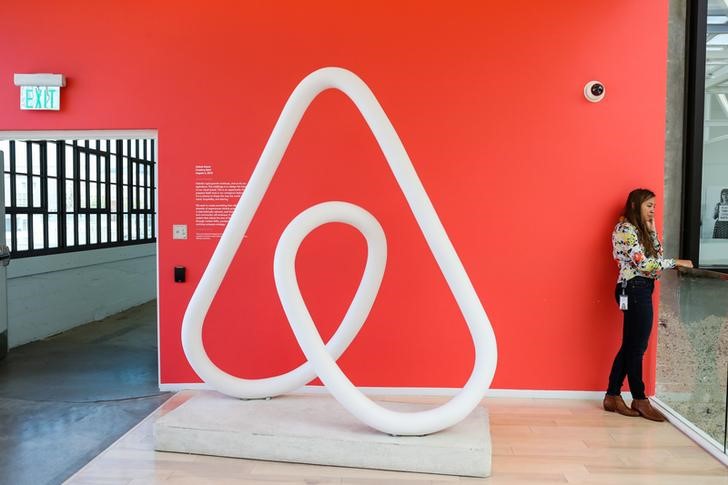Microsoft’s data-center shortages to persist longer than expected - Bloomberg
By Yasin Ebrahim and Liz Moyer
Investing.com -- Airbnb, the home-sharing company that shook up the hospitality industry, is preparing for its public debut.
An initial public offering expected to value it at more than $30 billion is finally set to launch on Wednesday, with Airbnb listing on Nasdaq under the ticker symbol ABNB.
It is just one of several big IPOs this year despite the volatility created by the pandemic. Airbnb is a popular brand and has given big hotel companies a run for their money, but regulatory and competitive risks are not to be ignored.
Investing.com's Yasin Ebrahim argues why Airbnb is a winning investment, while Liz Moyer says there are plenty of reasons for caution.
The Bull Case
Airbnb may be new to the public market, but privately it has been building up a track record that has competitors like Expedia and Bookings looking over their shoulder.
In 2019, Airbnb's gross bookings of $38 billion were 35% that of Expedia Inc (NASDAQ:EXPE) and 39% of Booking Holdings Inc (NASDAQ:BKNG)'s, but that gap has narrowed dramatically to 62% and 64%, respectively, in the year to date so far.
Some doubt whether this catch-up – driven by a pandemic-led surge in demand for social-distancing friendly alternatives to staying at hotels – can continue as the world begins to emerge from the pandemic, but the company has a knack for ensuring guests return.
"69% of our revenue in 2019 was generated from stays in that year by repeat guests, defined as guests with at least one prior booking, up from 66% in 2018 and 62% in 2017," the company said in its S-1 filed earlier this week. "We believe the guest revenue retention of our community is higher than the customer retention of OTA distribution platforms in the United States, based on available third-party credit card data."
Much of the sticky attraction that Airbnb enjoys among travelers comes from the power of its brand. Unlike its competitors, who turn to crowded marketplaces like Alphabet (NASDAQ:GOOGL) Inc Class C (NASDAQ:GOOG) to generate traffic, Airbnb doesn't have to suckle on the teat of advertisers to succeed: Its brand loyalty does the heavy lifting of marketing, generating a ton of direct traffic.
In 2019, Airbnb generated 23% of traffic from paid performance marketing channels, with the remainder from direct or from organic search results. While Booking Holdings has said about half of its customers come direct.
Generating unpaid online traffic is the holy grail for all travel businesses, but when Airbnb does put its foot on the marketing pedal, it's marketing dollars go further, wider and deeper.
Every dollar Airbnb spent on brand and performance marketing in 2019, yielded $33 in gross bookings; at Expedia it was $21, and at Booking $19.
This competitive advantage should stand the company in good stead in the coming quarters, which by the company's own admission will be fraught with difficulty amid a surge in Covid-19 infections.
Boasting a story that is easily understood by investors and the star power that generates repeat business from customers, Airbnb is one the few IPOs that makes the top of the list of fashionable investing.
The Bear Case
Airbnb is going for a $30 billion valuation, which would make it nearly as big as world-leader Marriott International Inc (NASDAQ:MAR)t’s $43 billion market value and about the same as Hilton Worldwide Holdings Inc (NYSE:HLT). Hyatt Hotels Corporation (NYSE:H), meanwhile, has a market cap of just $7 billion.
It gets bravery points for attempting an IPO in an environment hostile to hospitality companies. Revenue through September this year is down 32% from the same period last year after a horrible first and second quarter saw bookings dry up. Airbnb cut 25% of its workforce and slashed salaries and marketing budgets.
And it reoriented its home rental business to appeal to people who wanted a change of scenery -- a quick getaway during pandemic times, not too far from home but just enough to make the prolonged period working and studying from home bearable.
Longer-term, Airbnb has something going for it that gets at the heart of the Millennial generation: The desire to experience a new place like a local, not just a tourist.
Guess what will happen once a vaccine makes widespread travel likely, again? People are going to want to stay in places where other people pick up after them and cook for them, and that isn’t Airbnb.
That could be a long way off, still. In its registration filing, Airbnb acknowledges the giant hurdle the tourism, travel and hospitality sectors face in overcoming Covid-19. “Our future revenue growth depends on the growth of supply and demand for listings on our platform, and our business is affected by general economic and business conditions worldwide as well as trends in the global travel and hospitality industries,” it says.
In addition, there is significant regulatory risk to Airbnb. While the company has made renting out someone else’s house seem normal, it faces legal challenges from the hotel industry as well as local governments seeking to more tightly regulate the sharing economy. Big cities in tourist-magnate Spain, including Madrid, Barcelona and Valencia, have recently embraced curbs on short-term vacation rentals, for example. A group of 22 mayors from cities throughout Europe have been talking to the European Commission about the regulation of short-term rentals.
Finally, it comes down to competition. When Airbnb started shaking up the hotel industry, hotels were forced to respond, which they did in a big way with more limited-service, low cost and boutique experience properties.
Airbnb may well be one of 2020’s biggest IPOs, but its lasting role in the hospitality industry is still too early to tell.
